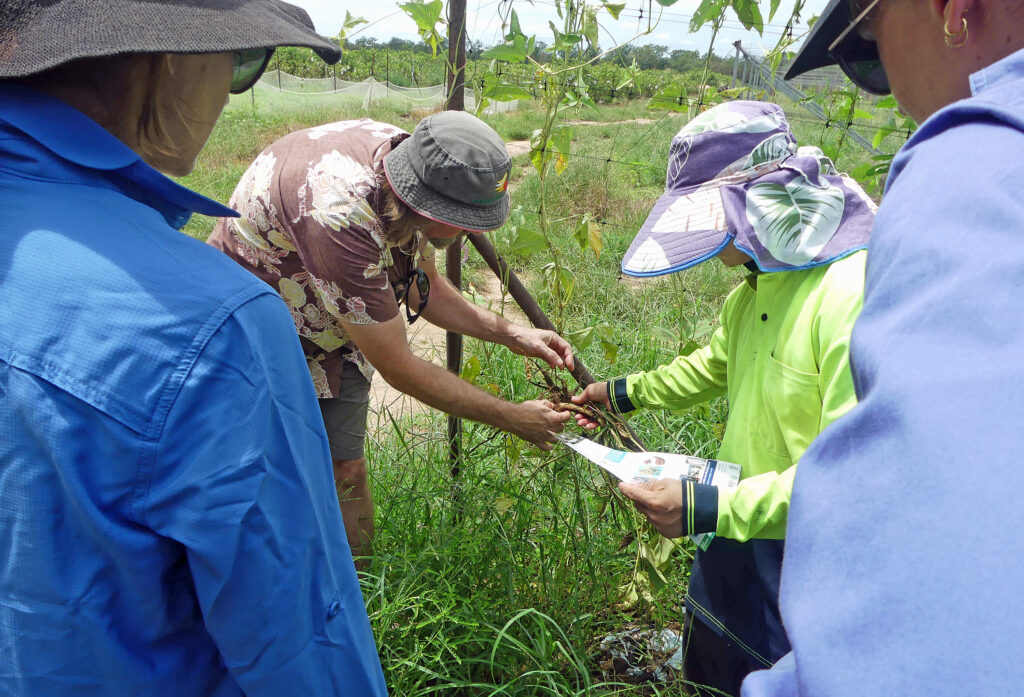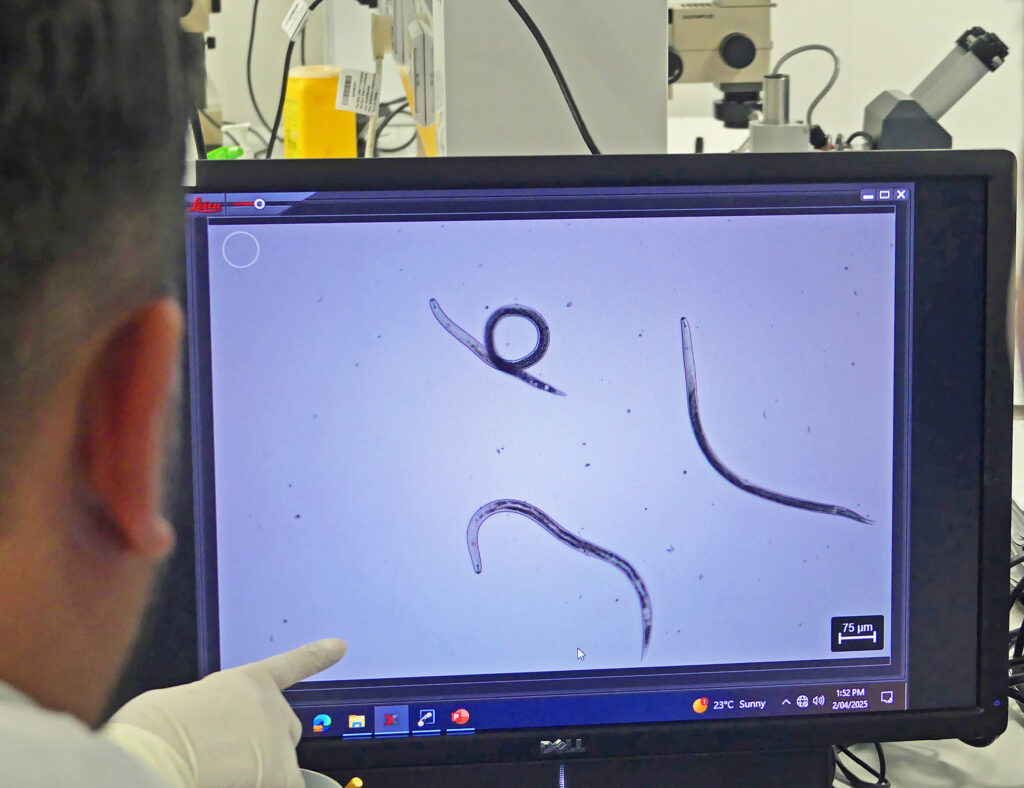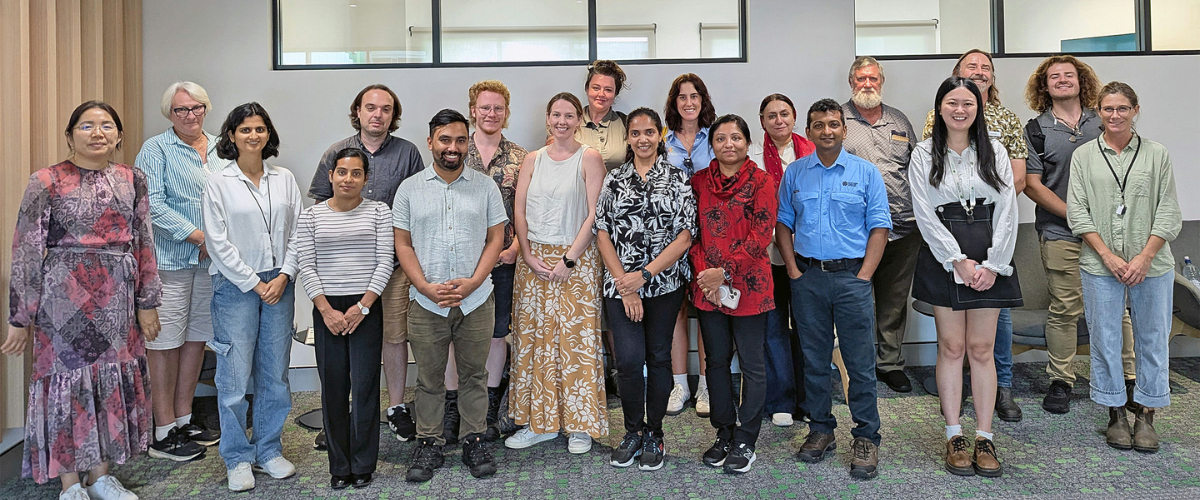Protecting pollinators from pesticides
30 April 2025Export market factsheets: optimising trade in the Australian vegetable industry
9 May 2025VegNET Northern Territory Regional Update
 Root-knot nematodes (RKN) are unfortunately not a new guest to Northern Territory soils. Guava root-knot nematode (GRKN) was detected in the NT in 2022, however other RKN species have been disrupting agricultural production in the NT for much longer.
Root-knot nematodes (RKN) are unfortunately not a new guest to Northern Territory soils. Guava root-knot nematode (GRKN) was detected in the NT in 2022, however other RKN species have been disrupting agricultural production in the NT for much longer.
RKNs are plant-parasitic nematodes from the genus Meloidogyne. They exist in soil in areas with hot climates or short winters which are both very relevant to the greater Darwin region.
The nematode larvae infect plant roots, causing the development of root-knot galls that drain the plant of photosynthate and nutrients. Infection of young plants can kill a crop, whilst infection of mature plants can still cause significant yield losses. About 2,000 species of plants worldwide are susceptible to infection by RKNs, so it’s no surprise that some of the common crops grown in the NT are susceptible.
The crop where RKNs appear most prominent in the Top End is okra. Okra is one of the NT’s most common vegetable crops, supplying the southern domestic markets (Sydney, Melbourne, Adelaide and Perth) for most months of the year.
Whilst most crops struggle to manage the wet season conditions, okra can withstand higher pest pressures, wetter soils and hotter, more humid environments. Common signs of RKN infection in okra plants are wilting, pale green leaves, stunted growth and eventual reduced yields. Pulling up one of these plants should show galling on the roots.
Like many soil-borne diseases, there are few quick fixes that provide long term relief from RKNs. An integrated approach is likely to yield the best results using a number of methods such as crop rotation, organic amendments, new to market nematicides as well as other biological treatments.
If you are a grower in the NT who has crops impacted by RKNs you’re in luck, as AUSVEG, the NT Government and VegNET are all assisting growers in this area. AUSVEG currently has a national GRKN identification and management project running, aimed at developing rapid diagnostic tools, enhancing targeted surveillance, identifying effective management strategies, and engaging stakeholders for effective GRKN management.
 The project team visited Darwin in early April 2025 to run an interactive workshop on GRKN which included both presentations and laboratory sessions. Industry stakeholders including agronomists, extension officers and researchers attended the event. The following day VegNET organised farms for the AUSVEG project leads to visit in the greater Darwin region. These growers were cautious that they may have RKN on their farms.
The project team visited Darwin in early April 2025 to run an interactive workshop on GRKN which included both presentations and laboratory sessions. Industry stakeholders including agronomists, extension officers and researchers attended the event. The following day VegNET organised farms for the AUSVEG project leads to visit in the greater Darwin region. These growers were cautious that they may have RKN on their farms.
The trip proved very helpful, with one farmer who was not aware they had GRKN on their property finding a positive diagnosis in their crop. At this stage the visual crop impact is limited to one plant so the team hopes early diagnosis can help minimise the impact to other areas of the property.
NT DAFF has recently hired a nematologist who will be working on the AUSVEG GRKN project on a local level. The nematologist is often on farms, working with growers to identify if they have RKNs on their property in particular GRKN, and to provide consultation on how they can best manage the incursion to minimise the impact to their production.
How does VegNET fit into these projects you may ask? VegNET often acts as the glue between growers and government or industry projects, knowledge and support. NT VegNET works with growers to make them aware of what services and support is available for issues they have such as nematode problems.
The project facilitates farm visits to allow researchers to meet with growers to better understand industry issues and for growers to get important information back from researchers about new knowledge. The VegNET project is also looking to run a RKN management trial on farm where different management techniques are tried over the 2025 season.

